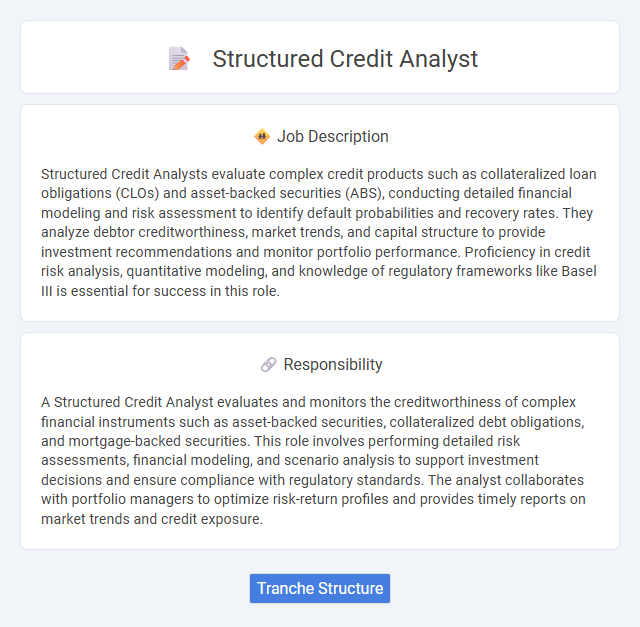
Structured Credit Analysts evaluate complex credit products such as collateralized loan obligations (CLOs) and asset-backed securities (ABS), conducting detailed financial modeling and risk assessment to identify default probabilities and recovery rates. They analyze debtor creditworthiness, market trends, and capital structure to provide investment recommendations and monitor portfolio performance. Proficiency in credit risk analysis, quantitative modeling, and knowledge of regulatory frameworks like Basel III is essential for success in this role.
Individuals with strong analytical skills, attention to detail, and a solid understanding of financial instruments are likely suitable for a Structured Credit Analyst role. Those who thrive under pressure and possess the ability to interpret complex data may find this job a good fit. Candidates lacking quantitative aptitude or struggle with risk assessment might face challenges in this position.
Qualification
A Structured Credit Analyst typically requires a strong background in finance, economics, or accounting, often supported by a bachelor's degree in these fields. Proficiency in credit risk assessment, financial modeling, and knowledge of structured finance products such as asset-backed securities (ABS) and collateralized loan obligations (CLOs) is essential. Advanced certifications like the CFA (Chartered Financial Analyst) or CPA (Certified Public Accountant) enhance a candidate's qualifications and career prospects in structured credit analysis.
Responsibility
A Structured Credit Analyst evaluates and monitors the creditworthiness of complex financial instruments such as asset-backed securities, collateralized debt obligations, and mortgage-backed securities. This role involves performing detailed risk assessments, financial modeling, and scenario analysis to support investment decisions and ensure compliance with regulatory standards. The analyst collaborates with portfolio managers to optimize risk-return profiles and provides timely reports on market trends and credit exposure.
Benefit
Working as a Structured Credit Analyst likely enhances expertise in evaluating complex financial instruments, improving risk assessment skills vital for informed decision-making. This role probably provides exposure to diverse credit products and market conditions, fostering analytical versatility. It may also offer opportunities for career advancement in finance through a deep understanding of structured finance and credit markets.
Challenge
The role of a Structured Credit Analyst likely involves navigating complex financial instruments and assessing multifaceted risk factors, making it a consistently challenging position. Analyzing the interplay between credit risk, market dynamics, and regulatory requirements probably demands advanced quantitative skills and detailed attention to emerging trends. This complexity may require continuous learning to adapt methodologies for accurate forecasting and creditworthiness evaluation.
Career Advancement
A Structured Credit Analyst role offers clear pathways for career advancement through specialization in complex financial instruments such as asset-backed securities, collateralized debt obligations, and mortgage-backed securities. Mastery in risk assessment, credit modeling, and market trends can lead to senior analyst positions, portfolio management roles, or leadership in credit risk teams. Advancement opportunities also include transitioning to investment banking, private equity, or credit strategy roles, leveraging deep analytical expertise and industry knowledge.
Key Terms
Tranche Structure
Structured Credit Analysts specialize in evaluating complex financial products by examining tranche structures, which segment debt into different risk and return profiles. They conduct detailed cash flow analyses and stress testing while assessing the creditworthiness of underlying assets within each tranche. Expertise in understanding waterfall mechanisms and loss absorption order is essential for accurately pricing securities and managing risk exposure.
 kuljobs.com
kuljobs.com